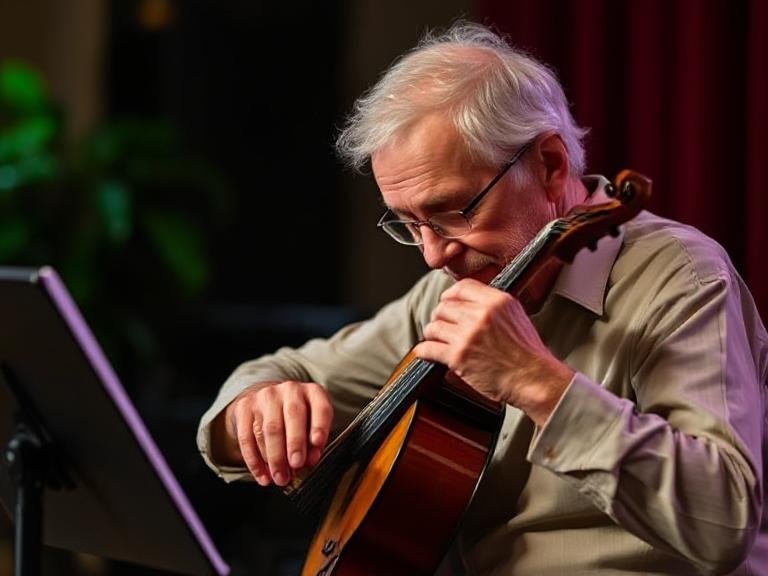
New Research Shows Playing Music Can Protect Against Brain Aging
A recent study published in PLOS Biology suggests that long-term musical training may help older adults maintain youthful brain activity patterns , especially when it comes to understanding speech in noisy environments.
Led by researchers Claude Alain from the Baycrest Academy for Research and Education in Canada and Yi Du from the Chinese Academy of Sciences, the study found that older musicians process speech in a way that closely resembles younger individuals , offering new insights into how music can protect the aging brain .
🧠 Why Speech Understanding Gets Harder with Age
As people grow older, they often find it more difficult to follow conversations in noisy places , like restaurants or crowded rooms. This is partly due to natural changes in the brain that affect how we process sound and interpret speech .
Older adults typically show increased brain activity and stronger functional connectivity — the way different brain regions communicate — as a kind of compensatory mechanism . In other words, the brain works harder to maintain cognitive performance despite age-related changes.
But this extra effort can be taxing — and it doesn’t always lead to better results.
🧠 What Is Cognitive Reserve?
Cognitive reserve refers to the mental resilience built up over a lifetime through activities like:
- Learning music
- Speaking multiple languages
- Higher education
- Mentally stimulating hobbies
People who develop a strong cognitive reserve often maintain better brain function as they age, even if their brains show signs of wear and tear.
The Cognitive Reserve Theory suggests that these experiences help the brain adapt more effectively to aging — and possibly even protect against conditions like dementia or hearing loss .
🔬 How the Study Was Conducted
To explore how musical training affects brain function in older adults, the researchers conducted brain scans using functional MRI (fMRI) on three groups:
- 25 older musicians
- 25 older non-musicians
- 24 younger non-musicians
All participants were asked to identify spoken syllables masked by background noise , while the researchers measured activity in the auditory dorsal stream — a network of brain regions involved in sound processing and speech perception .
🎼 What the Researchers Found
The study revealed striking differences between musicians and non-musicians:
- Older non-musicians showed the typical age-related increase in brain activity , especially in both sides of the auditory dorsal stream — a sign of the brain working harder to compensate.
- Older musicians , however, displayed brain activity patterns similar to those of young adults , particularly in the right side of the auditory dorsal stream , which was directly linked to better speech understanding in noise.
- Their brain connectivity was more “youth-like” , suggesting that years of musical training helped preserve the brain’s original wiring .
🧩 The “Hold-Back Upregulation” Hypothesis
The findings support what the researchers call the “Hold-Back Upregulation” hypothesis , which proposes that musical training helps maintain the brain’s youthful functional architecture rather than just compensating for age-related decline.
In other words, instead of the brain working harder to keep up , it stays more efficient , preserving the neural pathways that make speech perception and understanding easier.
This suggests that music doesn’t just delay aging — it might actually keep the brain more finely tuned over time.
🧘♂️ It’s Never Too Late to Start
While the study focused on lifelong musicians , the authors suggest that taking up an instrument later in life can still offer benefits.
Dr. Lei Zhang explains:
“A positive lifestyle helps older adults cope better with cognitive aging, and it’s never too late to start a rewarding hobby like learning an instrument.”
Dr. Yi Du adds:
“Just like a well-tuned instrument doesn’t need to be played louder to be heard, the brains of older musicians stay finely tuned thanks to years of training. Our study shows that this musical experience builds cognitive reserve, helping their brains avoid the usual age-related overexertion when trying to understand speech in noisy places.”
📚 Published in PLOS Biology
Study Title:
“Long-term musical training can protect against age-related upregulation of neural activity in speech-in-noise perception”
Authors:
Lei Zhang, Bernhard Ross, Yi Du, and Claude Alain
Published: July 15, 2025
📝 Final Thoughts
This study adds strong evidence to the growing understanding that music isn’t just a form of art — it’s also a powerful tool for brain health .
Whether you’ve been playing for decades or are thinking of starting now, it’s clear that learning and playing music can help keep your brain sharp and responsive , even as you age.
So if you’ve ever thought about picking up an instrument — there’s no better time than now.





